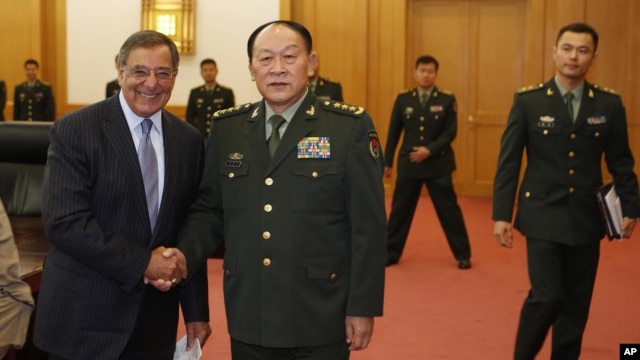
U.S. Defense Secretary Leon Panetta, left, and Chinese Defense Minister Liang Guanglie shake hands before their delegations meet at the Bayi Building in Beijing, China, September 18, 2012.
BEIJING — U.S. Defense Secretary Leon Panetta is calling on China to expand its military relations with the United States to avoid miscalculations as Beijing develops its armed forces and extends its influence in the Asia Pacific region.
The U.S. defense secretary had a full day of meetings Tuesday aimed at lessening China's suspicions about Washington's intentions as it pivots its forces to the Pacific.
After talks with Chinese Defense Minister Liang Guanglie, Panetta told reporters that expanding military relations will reduce the risk of miscalculations and confrontations in the future.
Panetta came to Beijing at sensitive time when China is embroiled in a territorial dispute with Japan over control of islands in East China Sea known to the Chinese as the Diaoyu - or the Senkaku to the Japanese.
“With respect to these current tensions, we are urging calm and restraint by all sides, and encourage them to maintain open channels of communication in order to resolve these disputes diplomatically and peacefully," he said. "It’s in no country’s interest for this situation to escalate into conflict which would undermine peace and stability in this very important region.”
U.S. and Chinese officials are taking visible, incremental steps to try to ease mutual suspicions. Panetta announced the U.S. is inviting China to send a ship to multi-national Rim of the Pacific maritime exercises in 2014. Chinese officials invited Panetta to visit a naval base in the northern city of Qingdao during his current visit to China.
The two also spoke of the need to continue cooperation in areas including operations to combat piracy on the high seas. U.S. and Chinese naval forces have already conducted joint anti-piracy operations.
In his remarks in Beijing Tuesday, Panetta said he is concerned about insider attacks that have been increasing on U.S. forces in Afghanistan. “I don't think that these attacks indicate that the Taliban is stronger. I think what it indicates is that they're resorting to efforts that try to strike at our forces, try to create chaos, but do not in any way result in their regaining territory that has been lost pursuant to what the ISAF and U.S. forces have been able to accomplish in terms of the transition," he added. "Nevertheless it is a concern.”
Panetta said General John Allen, the top U.S. commander in Afghanistan, is taking steps to counter those attacks and ensure a transition of security responsibility to Afghan forces as the U.S. draws down its forces.
NATO this week announced it is scaling back some of its joint operations with Afghan forces, a move aimed at protecting American and allied troops from future attacks by Afghan police and soldiers with whom they are working. |
|
